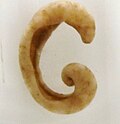Mollusca
Mollusca is a large phylum of invertebrate animals whose members are known as molluscs or mollusks ( ). Around 85,000 extant species of molluscs are recognized. The number of fossil species is estimated between 60,000 and 100,000 additional species.
Characteristics[edit]
Molluscs are the largest marine phylum, comprising about 23% of all the named marine organisms. Numerous molluscs also live in freshwater and terrestrial habitats. They are highly diverse, not just in size and in anatomical structure, but also in behaviour and in habitat. The phylum is typically divided into 9 or 10 taxonomic classes, of which two are entirely extinct.
Anatomy[edit]
Molluscs are characterized by a special type of coelom, a mantle, a radula, and a foot. The coelom is reduced to a small space surrounding the heart in adult molluscs. The mantle is a fold of the outer skin or epidermis, and it encloses the mantle cavity. The radula is a feeding organ, and the foot is used for locomotion.
Classification[edit]
The classification of molluscs has been subject to considerable revision. The system used here is the current system preferred by the Conchologists of America, which is based on the work of Winston Ponder and David Lindberg.
Ecology[edit]
Molluscs play important roles in the ecology of many environments. They are both prey and predator, and they are significant to the human economy.
Human interaction[edit]
Molluscs have been used by humans for food, tools, and as symbols and currency. They are also the cause of significant human diseases.
See also[edit]
References[edit]
<references />
External links[edit]
- Molluscs at The Living World of Molluscs
- Mollusca at University of California Museum of Paleontology
|
|
|
Mollusca[edit]
-
Mollusca Diversity
-
Snail
-
Marisa cornuarietis
-
Fossilized Ammonite Mollusk
-
Berlin Naturkundemuseum Muscheln
-
Cypraea chinensis with partially extended mantle
-
Archimollusc
-
Sea Snails
-
Gastropod nervous system
-
Chiton magnificus
-
Falcidens crossotus
-
Epimenia verrucosa
Ad. Transform your life with W8MD's Budget GLP-1 injections from $75


W8MD offers a medical weight loss program to lose weight in Philadelphia. Our physician-supervised medical weight loss provides:
- Weight loss injections in NYC (generic and brand names):
- Zepbound / Mounjaro, Wegovy / Ozempic, Saxenda
- Most insurances accepted or discounted self-pay rates. We will obtain insurance prior authorizations if needed.
- Generic GLP1 weight loss injections from $75 for the starting dose.
- Also offer prescription weight loss medications including Phentermine, Qsymia, Diethylpropion, Contrave etc.
NYC weight loss doctor appointmentsNYC weight loss doctor appointments
Start your NYC weight loss journey today at our NYC medical weight loss and Philadelphia medical weight loss clinics.
- Call 718-946-5500 to lose weight in NYC or for medical weight loss in Philadelphia 215-676-2334.
- Tags:NYC medical weight loss, Philadelphia lose weight Zepbound NYC, Budget GLP1 weight loss injections, Wegovy Philadelphia, Wegovy NYC, Philadelphia medical weight loss, Brookly weight loss and Wegovy NYC
|
WikiMD's Wellness Encyclopedia |
| Let Food Be Thy Medicine Medicine Thy Food - Hippocrates |
Medical Disclaimer: WikiMD is not a substitute for professional medical advice. The information on WikiMD is provided as an information resource only, may be incorrect, outdated or misleading, and is not to be used or relied on for any diagnostic or treatment purposes. Please consult your health care provider before making any healthcare decisions or for guidance about a specific medical condition. WikiMD expressly disclaims responsibility, and shall have no liability, for any damages, loss, injury, or liability whatsoever suffered as a result of your reliance on the information contained in this site. By visiting this site you agree to the foregoing terms and conditions, which may from time to time be changed or supplemented by WikiMD. If you do not agree to the foregoing terms and conditions, you should not enter or use this site. See full disclaimer.
Credits:Most images are courtesy of Wikimedia commons, and templates, categories Wikipedia, licensed under CC BY SA or similar.
Translate this page: - East Asian
中文,
日本,
한국어,
South Asian
हिन्दी,
தமிழ்,
తెలుగు,
Urdu,
ಕನ್ನಡ,
Southeast Asian
Indonesian,
Vietnamese,
Thai,
မြန်မာဘာသာ,
বাংলা
European
español,
Deutsch,
français,
Greek,
português do Brasil,
polski,
română,
русский,
Nederlands,
norsk,
svenska,
suomi,
Italian
Middle Eastern & African
عربى,
Turkish,
Persian,
Hebrew,
Afrikaans,
isiZulu,
Kiswahili,
Other
Bulgarian,
Hungarian,
Czech,
Swedish,
മലയാളം,
मराठी,
ਪੰਜਾਬੀ,
ગુજરાતી,
Portuguese,
Ukrainian









